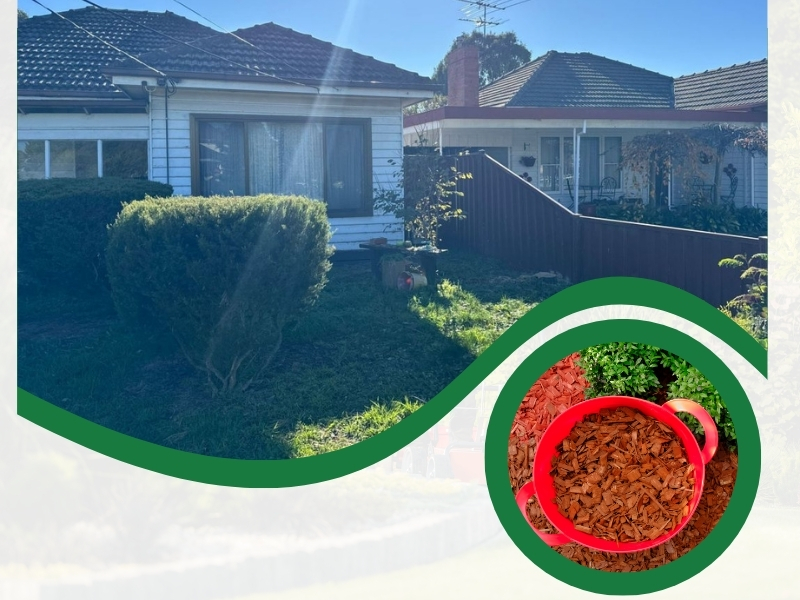Mulching is one of the most effective ways to protect and enhance the health of your bushes. By applying a layer of organic material around the base of your plants, you can insulate the soil, retain moisture, suppress weeds, and provide essential nutrients. But when is the best time to mulch your bushes? Melbourne’s temperate climate determines when and how you should mulch. This article explores the best practices for mulching bushes, the seasonal considerations, and how to ensure your bushes thrive all year.
Why should you mulch your bushes?
Discover the many benefits of mulch for soil health. Below are some crucial reasons why mulching is indispensable:
- Moisture retention: Mulch helps to keep the soil moist by reducing evaporation, particularly during Melbourne’s hot summer months.
- Weed suppression: A generous layer of mulch can hinder the growth of weeds near your bushes, minimising their competition for essential resources like water and nutrients.
- Soil temperature regulation: Mulch helps regulate soil temperature, providing a cooler environment in summer and a warmer one in winter, which is particularly beneficial in Melbourne’s fluctuating climate.
- Nutrient addition: As organic mulches decompose, they release nutrients back into the soil, enriching the environment for your bushes.
- Erosion prevention: Mulch helps prevent soil erosion caused by rain, wind, or irrigation, keeping the roots of your bushes well-anchored and protected.
How does mulching during different seasons affect your bushes?
The timing of your mulching efforts can significantly influence the effectiveness of this practice. Different seasons in Melbourne present unique challenges for garden maintenance, and mulching should be tailored accordingly.
Summer (December – February)
- Purpose: During Melbourne’s hot and dry summers, mulch is essential for moisture retention and soil temperature regulation. It helps protect the roots of your bushes from the intense heat and keeps the soil cool.
- Best mulch type: Organic mulches such as straw, wood chips, or shredded bark work well in summer as they decompose slowly, providing long-term benefits.
Autumn (March-May)
- Purpose: Autumn is an ideal time to mulch bushes in Melbourne, as the cooler temperatures and increased rainfall promote decomposition and nutrient release. Mulching in autumn prepares your bushes for the colder winter months.
- Best mulch type: Compost or leaf mulch can be particularly effective during autumn, providing insulation and nourishment.
Winter (June – August)
- Purpose: While Melbourne winters are mild compared to other regions, they can still bring cold spells and frost. Mulching during winter helps insulate the roots of your bushes, protecting them from frost damage.
- Best mulch type: A thicker layer of organic mulch, like bark or straw, can offer better frost protection while slowly breaking down to add nutrients.
Spring (September – November)
- Purpose: Spring is a time of new growth, and mulching this season can help your bushes thrive by improving moisture retention and suppressing the inevitable spring weed growth.
- Best mulch type: A lighter mulch, such as compost or finely shredded leaves, can enhance the rapid growth of your bushes in spring.
How often should you mulch bushes to maintain their health?
The frequency of mulching depends on the type of mulch used and the environmental conditions. Here’s a general guide:
- Annually: Most bushes require an annual mulching session in autumn or spring. This ensures that your bushes receive a steady supply of nutrients and protection throughout the year.
- Biannually: In some cases, particularly in areas with extreme heat or cold, you may want to mulch twice a year—once in spring and again in autumn.
- Monitor mulch thickness: Over time, mulch breaks down and becomes thinner. Check the thickness of your mulch layer every few months, aiming for a depth of 5-7 cm. Add more mulch as needed to maintain this ideal thickness.
When should you avoid mulching bushes?
While mulching has many benefits, there are times when it’s better to hold off:
- In wet seasons, Avoid mulching when the soil is waterlogged, such as after a prolonged rainy period. Excess moisture can lead to root rot and fungal issues.
- Immediately after planting: Newly planted bushes should not be mulched immediately, as mulch can trap too much moisture and prevent the roots from establishing correctly.
- During drought, without proper irrigation, Mulch retains moisture. Still, if your bushes are already suffering from a lack of water. If you don’t have an irrigation system, mulching might worsen the problem by trapping dry soil conditions.
What types of mulch are best for bushes?
Choosing the right mulch can significantly affect the health and appearance of your bushes. Here are some commonly used mulches that work well in Melbourne’s climate:
- Organic mulches: These include wood chips, straw, bark, and compost. They decompose over time, enriching the soil and improving its structure. Organic mulches are ideal for maintaining the long-term health of your bushes.
- Inorganic mulches: Materials like pebbles, gravel, or rubber mulch are long-lasting and can provide aesthetic appeal. However, they don’t offer the same nutrient benefits as organic mulches. They are best used in areas where minimal maintenance is desired.
- Compost: An excellent choice for nutrient-hungry bushes, compost not only suppresses weeds and retains moisture but also delivers essential nutrients as it breaks down.
How can you prepare your bushes for mulching?
Preparation ensures that mulching delivers the best possible results for your bushes. Here’s how you can prepare:
- Clear the area: Remove any weeds, old mulch, and debris around your bushes before applying new mulch.
- Water the soil: If the soil is dry, water it thoroughly before adding mulch. This helps lock in moisture.
- Edge your garden beds: Create a defined edge around your bushes to prevent mulch from spilling into unwanted areas.
- Test the soil: Check the pH and quality of your soil to ensure that the mulch will complement your bushes’ specific needs.
What are the best mulching practices for optimal growth?
Mulching is more than just spreading material around your plants. Follow these best practices for optimal growth:
- Apply mulch evenly: Spread the mulch evenly around the base of your bushes, aiming for a 5-7 cm thickness. Too thin, and it won’t provide enough protection; too thick, and it may suffocate the roots.
- Leave space around the trunk: Avoid piling mulch directly against the trunk or stems of your bushes. Leave a small gap to allow airflow and prevent rot.
- Monitor moisture levels: Mulch helps retain moisture, but avoiding overwatering is essential. Check soil moisture levels regularly and adjust your watering schedule as needed.
Mulch your bushes with The Yard
At The Yard, we offer professional mulching services tailored to Melbourne’s unique climate. Our team of qualified arborists provides expert advice and ensures the health and longevity of your bushes. Whether it’s tree pruning, trimming, or mulching, we ensure your garden stays vibrant all year round. Our 24/7 emergency response, commitment to safety, and dedication to customer satisfaction make us the go-to experts for all your tree care needs.
Ready to transform your garden? Hire The Yard for mulching and discover the difference our expert services can make.


